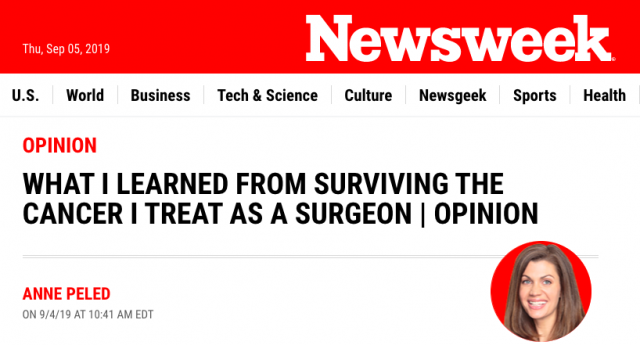
What I Learned from Surviving the Cancer I Treat as a Surgeon
No woman can fully comprehend how breast cancer can affect her life until she experiences it personally. As a breast cancer specialist who is also a breast cancer survivor, I can certainly attest to the gap between understanding the disease and surviving the cancer I treat. Unfortunately, I’ve also found personally and in my practice that a huge repercussion of surgery — emotional and psychological trauma — is chronically overlooked.
While survival is paramount, few consider the emotional impact that accompanies the visible scarring from breast cancer treatment. Many women who undergo breast cancer surgery never fully come to terms with their physical appearance, often having daily reminders of their surgery every time they look in the mirror. The emotional trauma related to incision scars can severely impact a woman’s mental health, her feelings of attractiveness and self-confidence, and sexual intimacy and relationships.
A staggering 12 percent of women in the United States will be diagnosed with breast cancer in their lifetime. Although oncologic outcomes from breast cancer treatment continue to improve, the prospect of an altered body image after surgery can be frightening, even with the cancer threat taken away.
However, in December 2017, following a biopsy of a lump I’d felt on a routine self-check that hadn’t gone away, I found myself completely unexpectedly in the role of a breast cancer patient after finding out the lump was invasive breast cancer.
I speak from experience, both on a professional and personal level. As a breast cancer and breast reconstruction surgeon, my goal has always been to provide guidance and education about options to help women make the best choice for themselves. I feel so grateful to get to play a role in my patient’s lives as they’re making these decisions, but definitely never thought I’d be considering these options for myself.
Fortunately, I had caught the cancer early and it was Stage I. I opted for an oncoplastic surgery that would allow for cancer removal and breast reconstruction in the same surgery, so I could wake up cancer-free and also be happy with how I looked, without the daily reminder of what I’d been through.
I’m so glad I made the choice to seek out surgeons who not only cared that my cancer was treated but also how I felt about myself moving forward and the psychological impact of the surgery. Too many women who undergo breast cancer surgery live with the painful reminder of their disease their entire lives, and I so appreciated that they wanted to do everything they could to help me feel and look like myself again.
Successful breast cancer surgery should allow survivors to move past their cancer, and scars play a big role in a woman’s ability to do this. Certainly, every woman is different and for some women, even very visible scars can be seen as symbols of victory and strength. But for others, they can be an obstacle, a source of shame, or a painful or disfiguring reminder of their cancer. According to one study, nearly two-thirds of women feel self-conscious about their breast cancer surgery scars, which can have a wide-reaching negative impact on many facets of their lives. I feel so grateful that my scars are well-hidden and my reconstruction was done in a way so that I don’t look like I ever had cancer surgery. I know this has a huge impact on allowing me to forget most days that I even had breast cancer.
Surgeons have the responsibility to educate women with breast cancer about scar-minimizing surgery options. The safest, most cost-effective, and patient-centered approach is to thoughtfully and cosmetically place scars and offer breast reconstruction when needed or desired at the time of the initial cancer surgery. This is essential to allow women to move past being breast cancer patients and instead become breast cancer survivors.
When I got diagnosed with breast cancer, I felt so fortunate to have access to exceptional care through my professional connections and the help of my family- my mom, dad, and sister are all breast cancer medical and radiation oncologists. One of the best memories from after my diagnosis was the day I got testing back that showed my cancer was low risk and I wouldn’t need chemotherapy: my parents were visiting and I knew when we celebrated with champagne that they truly felt the same relief that I did.
As a physician who does breast cancer and breast reconstruction surgery and research, I was very aware of all my treatment options. But many patients aren’t as lucky: one in three survivors say they didn’t know about all the surgical options available or even what to expect in terms of scars or breast appearance after surgery, which really limits a woman’s ability to feel good about her treatment choice. Recent advances in breast cancer surgery mean that women can have lumpectomies or mastectomies through hidden scars and reconstruction of the cancer site at the same time, which allows them to look the same or sometimes better than they did before surgery.
Dr. Anne Peled is a board-certified plastic surgeon in California who specializes in breast, reconstructive, reduction, and cosmetic surgery. She is uniquely trained as both a plastic surgeon and a breast surgeon and is recognized as a Hidden Scar trained surgeon.
The views expressed in this article are the author’s own.




